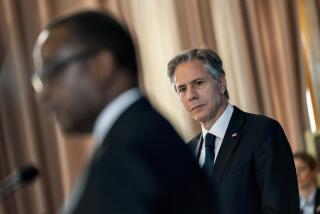Africa Starts a Housecleaning
- Share via
Landlocked Burundi exports its small coffee crop overland and imports fuel and just about everything else it needs through ports in Tanzania and Kenya. Those routes are now closed because of a regional blockade launched to protest the July coup by the Tutsi-led Burundian army. The strong action by Burundi’s big neighbors should pressure those who hold power to restore constitutional rule, reopen Parliament, reinstate political parties and arrange for talks between rival factions.
Tanzania deserves credit for taking the lead, and acting quickly, after the July 25 coup that installed Maj. Pierre Buyoya as Burundi’s president. Regional responses to African problems are now endorsed by the Organization of African Unity, whose secretary general, Salim Ahmed Salim, supports the blockade. Regional actions, like the Nigerian-led peacekeeping force that helped put down a civil war in Liberia, have become Africa’s best hope for peace and order. The prospects of a Western role have greatly diminished since the failed U.N. peacekeeping mission in Somalia and the end of the Cold War competition on the continent.
The Africans appear ready to clean their own house this time. Uganda has joined the blockade, further reducing access to Burundi. Ethiopia has cut off air travel. Neighboring Rwanda, which is still recovering from a fratricidal war that killed as many as 1 million people in 1994, has threatened to close its borders and halt flights next week. These countries are sending the right message.
The economic sanctions are already beginning to hurt. Gas stations are running out of fuel. At least 10,000 tons of cargo intended for Burundi remains stranded at Tanzanian and Kenyan ports. As the economic noose tightens, pressure will mount on Burundi’s Tutsi leaders to stop the killing and reinstate President Sylvestre Ntibantunganya, a Hutu, who remains secluded in the U.S. Embassy. Africa, at last, demands it.
More to Read
Sign up for Essential California
The most important California stories and recommendations in your inbox every morning.
You may occasionally receive promotional content from the Los Angeles Times.













